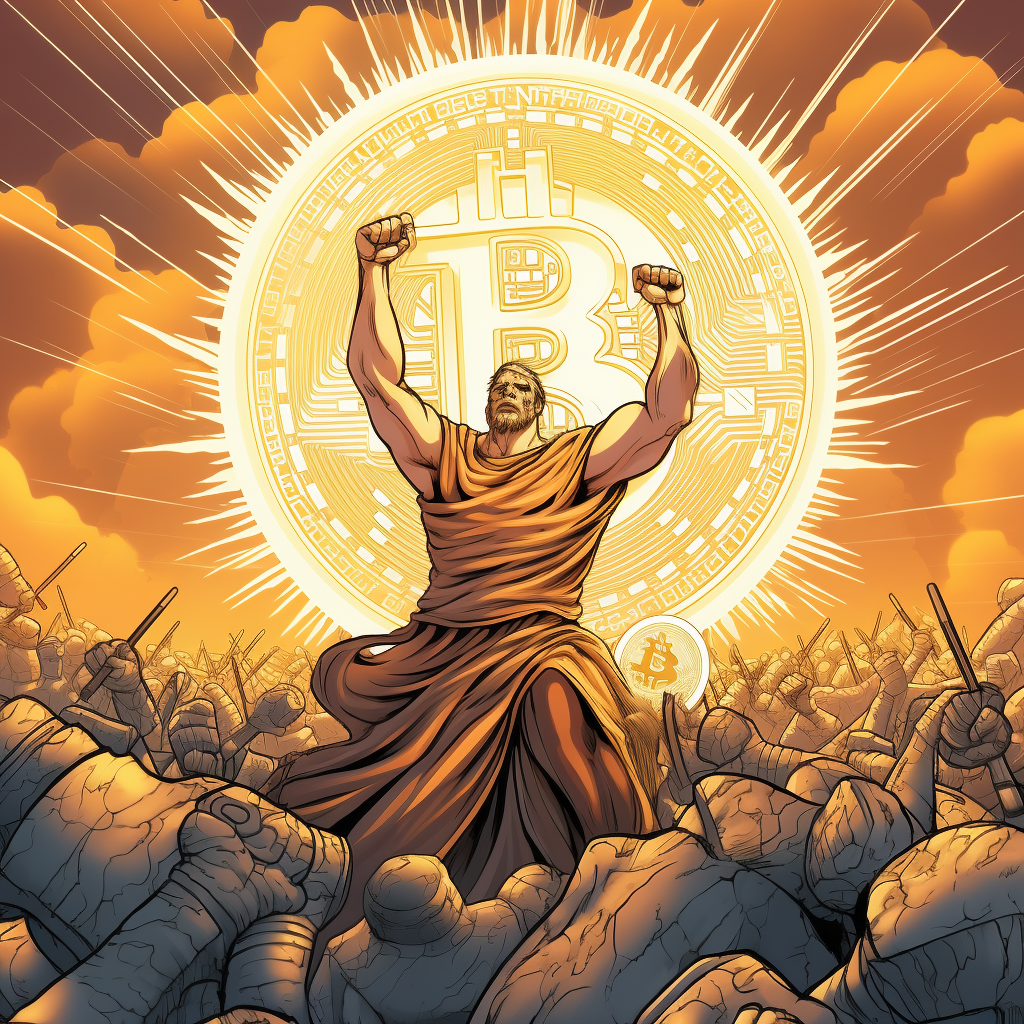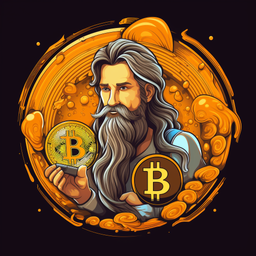How Bitcoin Solving The Double-Spend Problem Empowers Us All
Beyond the hype and value, Bitcoin is reshaping the internet's landscape by addressing double-spending and Byzantine issues.

We've all seen the transformative power of the internet. It's reshaped how we live, learn, work, and play. It's connected us in ways that we could have never imagined just a few decades ago. It's redefined industries, toppled giants, and given birth to new titans.
A prime example of this is Amazon, a company that started in a garage selling books, and now, it's an omnipresent marketplace offering everything from A to Z, making Jeff Bezos one of the richest men in the world.
Yet, as groundbreaking and far-reaching as the internet has been, it wasn't perfect.
There were two significant problems that held it back from its full potential: the double-spending problem and the Byzantine Generals' Problem.
It's essential to understand these foundational problems - the double-spending problem and the Byzantine Generals' Problem - to fully appreciate the value of Bitcoin and the doors it's opened.
In the sections that follow, we will delve into these issues, why they matter, how Bitcoin solves them, and what this means for people looking for new economic opportunities.
So buckle up and get ready to step into the future. The world of Bitcoin awaits!
The Internet's Limitations: Unmasking the Double-Spending Problem
Imagine if you could walk into a store, buy a loaf of bread with a $10 bill, and then walk into the next store and buy a cup of coffee with the same $10 bill.
Sounds pretty good for you, but not so good for the stores, right? This might seem impossible in the physical world, but in the digital realm, it's a real concern. This is what we call the 'double-spending problem'.

In the digital world, duplicating information is as easy as copy and paste. This ability to duplicate is fantastic for sharing cute cat photos or forwarding emails, but it's not so great when it comes to money.
If digital money could be copied and spent more than once, it would be worthless. Who would accept your digital dollar knowing that it might be a copy of a dollar you've already spent somewhere else?
That's why, until the arrival of Bitcoin, digital cash was a pipe dream.
We had to rely on middlemen - banks, credit card companies, and payment processors - to keep track of our money and ensure that each digital dollar was spent only once. They were the guardians of trust in our transactions.
Bitcoin's Ingenious Solution: Conquering Double-Spending
Then came Bitcoin, wielding an innovative solution to this double-spending problem. Instead of relying on a central authority like a bank, Bitcoin introduced a public ledger called the blockchain. This ledger records every Bitcoin transaction that ever happens. It's open to everyone and can't be tampered with, creating an immutable history of transactions.
Here's how it works: When you make a transaction, it's broadcasted to a network of computers (known as nodes) that run Bitcoin's software. These nodes validate the transaction to make sure you haven't tried to spend the same Bitcoin elsewhere. Once they reach consensus that the transaction is legit, it's added to the blockchain.
This transparency and decentralization mean that you don't need to trust a bank or payment processor anymore. Instead, you're trusting a system - the Bitcoin network. It's an ingenious solution that’s like a breath of fresh air in a world that’s becoming increasingly skeptical of traditional banking systems.
This solution to the double-spending problem has far-reaching implications.
By creating a trustworthy, decentralized form of digital money, Bitcoin opens up a world of opportunities for everyone, including folks who may have felt left behind by the traditional financial system. It's a game-changer, and we're only just beginning to explore the possibilities.
The Second Hurdle: Understanding the Byzantine Generals' Problem
Before we dive into the heart of the issue, let's take a brief journey back in time. The Byzantine Empire, which lasted a thousand years from the 4th to the 15th century, was renowned for its mighty army. These armies were known for their exceptional ability to withstand and conquer, even in complex and difficult situations.
Now, picture this: A group of generals, each leading a part of the Byzantine army, have surrounded an enemy city. They need to plan an attack but there's a catch. They can only communicate via messengers and, to make matters worse, some generals might be traitors, intentionally sending misleading messages.
Here's their conundrum: How can they ensure that all loyal generals follow the same plan - either to attack or retreat - based on the majority's decision? And how can they make sure this plan is foolproof, even if there are traitors in their midst trying to sabotage their efforts?

This is what computer scientists refer to as the Byzantine Generals' Problem. It's a stumbling block in the realm of distributed systems - systems where multiple participants must work together and agree on a single course of action. And just like these ancient generals, digital transactions need a high level of coordination and trust.
In the context of digital transactions, the Byzantine Generals' Problem poses a critical challenge: How can the system verify that all transactions are valid and everyone agrees on the order of transactions, even when some participants might act dishonestly or fail?
It's a puzzle that needs solving to ensure the trustworthiness of any digital system - and that's where Bitcoin steps in.
Bitcoin's Breakthrough: Overcoming the Byzantine Generals' Problem
Enter Bitcoin once again with a groundbreaking solution. By utilizing a process called proof-of-work, Bitcoin ensures that all participants in the network reach a consensus on the transaction history, even if some participants are acting maliciously or dishonestly.
Here's a simplified version of how it works: Bitcoin miners (the equivalent of our loyal generals) have to solve complex mathematical puzzles to add a block of transactions to the blockchain. The first one to solve the puzzle broadcasts their solution (the new block) to the rest of the network. The other miners then verify this solution. If it checks out, every participant in the network adds this block to their copy of the blockchain.
This process makes altering past transactions or creating fake ones extremely difficult, if not impossible. It would require an enormous amount of computing power and is thus highly impractical. This proof-of-work system, therefore, ensures trust and reliability in the Bitcoin network.
In overcoming the Byzantine Generals' Problem, Bitcoin not only solves a significant digital trust issue but also gives us a robust and decentralized financial system where trust is established not by middlemen but by network consensus.
It's another huge stride in making digital currencies a reliable tool for everyone, fostering a more inclusive and open financial system.
Bitcoin in Action: Real-World Implications and Opportunities
As we've unraveled, Bitcoin isn't just another digital currency. By solving the double-spending problem and the Byzantine Generals' Problem, it's a catalyst for economic transformation.
So, what does this mean for the hardworking individuals out there who are looking for opportunities in the digital age? Let's delve into some real-world implications and opportunities that Bitcoin has unleashed.
1. Empowering individuals
Traditional financial systems often exclude a substantial segment of the global population due to the lack of access to banking services.
Bitcoin, however, is a borderless, open-access currency.
With just a basic smartphone and internet connection, anyone can make transactions, empowering individuals worldwide to participate in the digital economy.
Watch North Korean defector and human rights activist Yeonmi Park share her experience and discusses how bitcoin could help provide financial support to those living under authoritarian leadership in the following video:
2. Creating a global marketplace
With Bitcoin, you can seamlessly send and receive money anywhere in the world, overcoming the limitations and fees of cross-border transactions.
This has paved the way for a truly global marketplace, connecting hardworking individuals with opportunities across the globe.
For instance, the traditional remittance system is fraught with issues, including high transaction fees, slow processing times, and a lack of transparency. These challenges are particularly felt by individuals in developing countries, who rely heavily on remittances for their livelihoods.
Companies like Strike and TBD @ Block are pioneering Bitcoin-powered remittance services.
Strike, a mobile payment application, leverages the Bitcoin blockchain to facilitate money transfers, utilizing the Lightning Network for efficient transactions.
Recently, TBD announced a partnership with Yellow Card to enhance global payments in Africa via Bitcoin and stablecoin rails. This partnership is aimed at creating a network that combines traditional payment rails with stablecoins and Bitcoin, significantly boosting Bitcoin and stablecoin adoption in financial and commercial applications.
With Bitcoin-powered solutions like Strike and strategic partnerships like TBD and Yellow Card, the global remittance industry could undergo a significant transformation, creating a more efficient, transparent, and inclusive global remittance network.
3. Fostering digital scarcity
Bitcoin's design includes a maximum supply of 21 million coins, introducing the concept of digital scarcity.
This has led to the creation of "digital gold," a store of value in the digital realm.
This can serve as a hedge against inflation, protecting the value of hard-earned money. Watch Lary Fink, the CEO of World's largest money manager BlackRock talk about how Bitcoin is an international asset that is overtaking gold.
BlackRock CEO Larry Fink: "I do believe the role of crypto is...it is digitizing gold in many ways."......."Let's be clear: #bitcoin is an international asset" pic.twitter.com/TPlK7IPWSD
— Pledditor (@Pledditor) July 5, 2023
4. Inspiring Innovation
The blockchain technology that underpins Bitcoin has broad implications far beyond digital currency.
It's driving innovations in various sectors, such as supply chain, healthcare, and the arts. For example, the recent Bitcoin Ordinals project enables artists to monetize their work in unprecedented ways, offering an exciting new avenue for creative individuals.
We’ve begun rolling out support to Hiro Wallet for Bitcoin, NFTs and Ordinals for a truly cross-protocol Bitcoin Web3 experience. https://t.co/OAVriTraFq
— Mark Hendrickson | mark.btc | Hiro Wallet (@markymark) February 14, 2023
🧵 A thread with details… #bitcoin #web3 #stx #nfts #ordinals pic.twitter.com/SiWrIluFhk
5. Enabling 'blue ocean' opportunities
Bitcoin has created a whole new economic playing field, providing 'blue ocean' opportunities - untapped and uncontested market spaces ripe for growth. These range from Bitcoin mining and trading to creating Bitcoin payment gateways and consulting services.
As we move deeper into the digital age, the impact of Bitcoin's breakthroughs is becoming increasingly evident. It's clear that Bitcoin isn't just a new way of doing old things – it's paving the way for doing things that were never before possible, empowering everyday people to participate in the digital economy on a level playing field. With Bitcoin, the potential for economic opportunity is not just preserved for the few but opened up for many.

Digital Scarcity and Bitcoin: A New Form of Wealth
As we've stepped into the realm of Bitcoin, a term you may come across is "digital scarcity." But what does it mean, and how does it tie into Bitcoin's potential for long-term value? Let's break it down.
In the physical world, we understand the concept of scarcity. Take gold, for instance. There's a limited amount of gold on Earth, and we can't create more of it at will. This limited supply, combined with its desirability, is what gives gold its value.
Now, let's take this concept to the digital realm. Before Bitcoin, digital items could be duplicated endlessly. If you've ever copied a file on your computer, you'll understand this principle. However, Bitcoin changed the game.
Similar to gold, there is a finite number of Bitcoin – 21 million, to be precise. Once all Bitcoins have been mined, there won't be any new ones. This limit is hard-coded into the Bitcoin system, creating a level of scarcity previously unseen in the digital world.
So, why is this significant?
Because this digital scarcity is what gives Bitcoin its value. Today, Bitcoin is often referred to as 'digital gold', a store of value in the cyber world. The total value of all the gold on Earth is approximately ten trillion dollars, an astronomical figure. Bitcoin, while not yet at that level, has the potential to reach or even surpass it due to its unique properties and growing acceptance.
But let's step further into the future. As more and more use cases for Bitcoin emerge, its potential value only increases. Imagine a world where Bitcoin doesn't just represent digital gold but becomes a form of "digital real estate." The value of total global real estate was estimated to be over $300 Trillion in 2020.
Just as real estate owners in the physical world can rent out their properties for income, the scarcity of Bitcoin could, one day, create a similar dynamic in the digital world.
Given its limited supply, owning Bitcoin could be like owning a piece of the digital landscape. As the demand for that "digital property" increases, so could the potential for generating income from it.
To be part of this future, it might be beneficial to understand and, possibly, start investing in Bitcoin today. Remember, the opportunities that Bitcoin brings are not just for the tech-savvy or the wealthy. They're for everyone.
With knowledge, understanding, and a bit of courage, anyone can potentially tap into these opportunities and create new forms of wealth in this emerging digital era.
Financial Empowerment with Bitcoin: A Gateway to Prosperity
When it comes to financial freedom, Bitcoin offers a beacon of hope. The Bitcoin network is decentralized, meaning no central authority controls it. Anyone with a phone and internet access can potentially send and receive bitcoins from anywhere in the world, unbounded by national borders or traditional banking hours.
This presents an extraordinary opportunity for everyone, especially for those who feel left behind by the conventional financial system.
Bitcoin not only represents a new form of currency but also a new form of investment. Just as you might invest in stocks or real estate, you can also invest in Bitcoin. Its digital scarcity, as discussed earlier, is what gives Bitcoin its intrinsic value and its potential for long-term appreciation.
You may be thinking, "Is investing in Bitcoin risky?" As with any investment, there are risks involved. The value of Bitcoin can be volatile, and it's important to never invest more than you can afford to lose.
However, with careful planning, educating yourself, and perhaps seeking advice from financial advisors, investing in Bitcoin can be a step towards achieving financial freedom and seizing these exciting new digital opportunities.
The Future is Here: Bitcoin's Promise for a Prosperous Digital Economy
Bitcoin's groundbreaking solutions to the double-spending and Byzantine Generals' problems have opened up a universe of possibilities in the digital world.
Bitcoin transactions can't be reversed or duplicated, bringing a newfound level of trust to digital commerce. The ability to send money across the globe, almost instantly and at any time, simplifies international transactions. This is just the beginning of the future that Bitcoin is paving.
Furthermore, Bitcoin is more than just a digital currency; it's also the first widespread use of blockchain technology. Blockchain is a decentralized, transparent, and secure system of recording transactions, which has implications far beyond digital currency.
Industries from healthcare to supply chain to digital rights management are exploring blockchain's potential to revolutionize how they operate.
So, what does all this mean for you?
It means you're standing on the precipice of a new era. This isn't a future that's years away; it's happening right here, right now. The advent of Bitcoin and blockchain technology is creating new avenues for investment, new methods of conducting business, and new pathways towards financial freedom.
And the best part?
You don't need to be an expert or a millionaire to participate. All you need is a bit of knowledge, a dash of curiosity, and the courage to step into this new digital frontier.
Bitcoin is more than just a digital currency; it's a potential gateway to prosperity. And it's not just for the Jeff Bezos of the world; it's for everyday people who work hard and dream big. It's for you. So, are you ready to seize the opportunities that Bitcoin presents? The future is here, and it's digital.
Conclusion
As we wrap up our journey, it's crucial to remember the essence of what we've learned. The internet, which has become an integral part of our lives, was held back by two significant issues: the double-spending problem and the Byzantine Generals' Problem. These problems threatened the trust and reliability of digital transactions and the potential growth of a digital economy.
Then came Bitcoin, a revolutionary solution that not only solved these issues but also opened up a world of exciting new opportunities. By tackling the double-spending and Byzantine Generals' problems, Bitcoin paved the way for a more trustworthy digital currency and a whole new paradigm of digital commerce and investment.
But the potential benefits of Bitcoin go beyond its technological marvels. Bitcoin represents a lifeline, a beacon of financial empowerment for every hardworking individual who has ever felt left out by the conventional system. Bitcoin offers a gateway to economic opportunities that were previously unheard of, democratizing access to wealth and prosperity.
Investing in Bitcoin: Your Ticket to Long-term Wealth
Investing in Bitcoin is akin to an oceanic voyage, navigating through storms and calm, but with potential treasures that lie ahead. Be it for a car, a house, a trip, retirement, or a wedding, Bitcoin could be your vehicle of choice.
An intriguing aspect of Bitcoin is its 200-week moving average that never dips, only rises. Don't believe us? Take a look for yourself here:

With this insight, consider Bitcoin not as a quick route to wealth, but as a long-term investment. Remember, its short-term volatility is not a risk but the entry cost to potentially substantial long-term gains.
Why not establish a new savings goal today and incorporate Bitcoin into your plan? It's about more than just adding to your savings; it's a potential pathway to financial stability and empowerment.
This is your chance to be part of a future-defining venture. It all begins with one step - investing in Bitcoin. So, take that step, weather the volatility, and look towards the promise of a potentially prosperous future.


